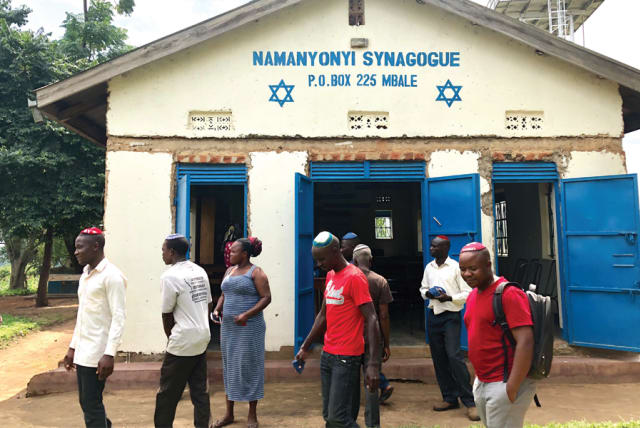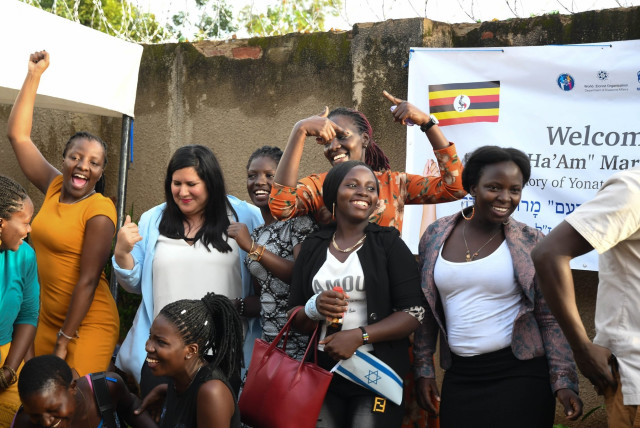Plight of the Abayudaya: 'They are our brothers, our flesh' - opinion

The Abayudaya are our brothers and our sisters and the time has come for the State of Israel and JAFI to recognize this fact and welcome them into the fold of our people.
Amid the plethora of political and ethical problems that currently confront the State of Israel, there is a moral challenge to the concept of Jewish peoplehood that has been overlooked – the plight of the Abayudaya Jewish Community of Uganda, as they seek recognition as Jews by the State of Israel.
On March 28, 2016, the Jewish Agency for Israel officially granted the Abayudaya the status of a “recognized Jewish community.” After all, the community had two Jewish day schools, nine Masorti congregations, two additional Orthodox clergymen serving the Orthodox members of the Abayudaya community, and another Orthodox congregation that follows the Spanish-Portuguese rite.
In a letter written on February 5 of this year by Chief Rabbi Gershom Sizomu; Kirya Geoffrey, board chair of the Abayudaya Congregation; Rabbi Moshe Madoi, leader of the Orthodox Abayudaya community, and Avram Mukiibi, president of the Zionist Movement in Uganda to The Jewish Agency for Israel, these community leaders complained that the Israeli Interior Ministry had walked back that decision and now refused to recognize the Abayudaya as a Jewish community.
These leaders expressed their desire for ever-closer ties to the world Jewish community and to Israel. They placed special emphasis on their children, stating that they would like their youth to be eligible for Birthright and Masa programs that bring together young Jews from all over the world to Israel. They called upon JAFI to work with them for the recognition of the Abayudaya Jewish community in Uganda as a legitimate Jewish community whose members and youth could participate fully in the Zionist enterprise.
JAFI, in its response to the Abayudaya leaders on April 3, stated that the Abayudaya were not a “recognized Jewish community” on the grounds that the Interior Ministry and the Population and Immigration Authority of the State of Israel refused to extend such recognition to them.
JAFI instead identified the Abayudaya as an “emerging community” and maintained that this definition of the community meant that it could neither advocate for the recognition of the Abayudaya as “Jews” under the Law of Return nor allow Ugandan Jewish youth to participate in programs like Masa.
This distinction between an “emerging community” and a “recognized Jewish community” is of significant importance in Israeli jurisprudence. In past decisions that dealt with the issue of converts, the Israeli High Court of Justice had held that the State of Israel would recognize a conversion as legally valid only if it took place under the auspices of a rabbinical court that existed in a “recognized Jewish community.” The court also observed that the “community” could be “Reform, Conservative or Orthodox.”
Persons converted under the aegis of such courts would be considered “Jews” and granted immediate Israeli citizenship under the Law of Return and be registered as “Jewish” in the State Population Registry. By choosing to identify the Abuyadaya community as an “emerging” one rather than a “recognized” one, both the Ministry and JAFI denied Jewish status to the Abayudaya in what can charitably be called a “mean-spirited” decision.
To be sure, the Abayudaya only began to embrace Judaism formally in the early 20th Century. Nevertheless, their commitment to Jewish religious tradition and to concepts of Jewish peoplehood has been firm and steadfast for all this time.
Though they were persecuted as Jews and their synagogues destroyed during the 1970s, their fidelity to the Jewish people and religion did not waver. Furthermore, as the ordination of Rabbi Sizomu at the American Jewish University and the attendance of Shoshana Nambi in the rabbinical program of Hebrew Union College indicate, the Abayudaya seek full participation in the worldwide community of the Jewish people.
Their allegiance to Jewish tradition and their desire to earn the recognition of their fellow Jews as legitimate members of the Jewish community is also evidenced in the formal conversion of more than 2,000 Abayudaya persons to Judaism in the last two decades. One thousand six hundred members of the community converted to Judaism under the auspices of Masorti (Conservative) rabbinical courts, while the famed Orthodox Rabbi Shlomo Riskin of Efrat brought an additional 400 members of the Abayudaya “under the wings of the Shechinah.”
Given that the High Court deemed Orthodox and Conservative rabbinic courts legally valid for conferring Jewish status upon individuals for the purposes of the Law of Return, JAFI’s insistence that the Abuyadaya be denied Jewish status on the grounds that theirs is an “emerging Jewish community” seems to be an outright racist categorization that brings no honor to the State. It is a dismissive and prejudiced stance that the State and JAFI should immediately reverse.
In 1864, Rabbi Esriel Hildesheimer, destined to be the founder of the Berlin Orthodox Rabbinerseminar in 1873, issued a “Circular to the Household of Israel.” Hildesheimer defended the Jewishness of the Beta Yisrael of Ethiopia at a time when countless Jewish leaders sought to cut off these Jews of color from the world Jewish community. He stated that his heart trembled when he considered this, for, “Are not all Jews responsible for one another?” Hildesheimer, therefore, held that it was “time to speak and serve the Lord” by welcoming these Jews into the arms of the Jewish people.
In words that echo today as we consider the plight of the Abayudaya, he proclaimed, “They are our brothers and our flesh. The time has come to rescue them and help restore them to the life” of Klal Yisrael.
We today can ask no less for the Abayudaya than Rabbi Hildesheimer asked for the Beta Yisrael 160 years ago. The Abayudaya are our brothers and our sisters and the time has come for the State of Israel and JAFI to recognize this fact and welcome them into the fold of our people.
The writer, a rabbi, is chancellor emeritus of Hebrew Union College-Jewish Institute of Religion and a member of Achvah: The Partnership for Abayudayah Rights.
Jerusalem Post Store
`; document.getElementById("linkPremium").innerHTML = cont; var divWithLink = document.getElementById("premium-link"); if (divWithLink !== null && divWithLink !== 'undefined') { divWithLink.style.border = "solid 1px #cb0f3e"; divWithLink.style.textAlign = "center"; divWithLink.style.marginBottom = "15px"; divWithLink.style.marginTop = "15px"; divWithLink.style.width = "100%"; divWithLink.style.backgroundColor = "#122952"; divWithLink.style.color = "#ffffff"; divWithLink.style.lineHeight = "1.5"; } } (function (v, i) { });

